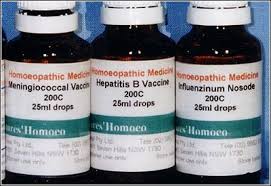So what is the new fuss about homeopathic medicines and the FDA? The FDA concluded its two days of public testimony regarding homeopathy and their potions. The issue is if should homeopathy medicines be regulated to the same extent as conventional medicine. This has become an issue when some homeopathic medicines were found to contain active compounds that have caused harm:
You may recall that several Zicam products (nasal spray) were recalled because over 100 people reported the loss of smell. This product was labeled as homeopathic- and therefore, said to cure the common cold.
Hyland’s Baby Drops – allegedly used for teething- has been found to contain some active Belladonna (the poison found in those bad mushrooms). Toxic levels have been found in some of these drops. They were recalled in 2010, but brought back to the market with “improved manufacturing” in 2011. This product was labeled as homeopathic- and therefore parents were giving this to their teething infants, inadvertently poisoning some of them.
A number of liquid homeopathic remedies contained high amounts of alcohol – higher than what is typically allowed in medicine.
Many are lead to believe that homeopathy is just diluted water so it is harmless, but too many makers of products have taken advantage of the “homeopathic” label, which was given a free pass from the FDA for a long time. They increased the amounts of “ingredients” in their products which have caused adverse side effects.
Two issues the FDA is deciding – are they effective and are they safe:
Should homeopathic “medicines” be tested for efficacy? Homeopathic potions are currently are not tested to show if they are effective for their “labeled” use. Since they are “prescribed” by a homeopathic physician, or endorsed over-the-counter and labeled as a homeopathic treatment, some of the public assumes that these potions might have some efficacy. There have been trials of these medicines of course, and when high-quality trials were performed homeopathic potions showed no efficacy. A good quality trial would be where the patients with a similar disease are randomized to who gets either the homeopathic or conventional treatment and both the patient and physician blinded as to if they get conventional or homeopathic medicine.
If the potions of homeopathy are found to not be as effective as conventional treatments, then they would not be granted license to be marketed.
The second issue is if they are regulated there is a robust reporting mechanism for side effects of the medicine. With traditional drugs, once a medicine is found to be effective, have a toxic dose established, and placed on the market, the FDA relies upon adverse reaction reporting to further monitor the drug. The FDA currently does not have this reporting mechanism in place for homeopathic potions.
Poor quality studies:
If you go to any homeopathic site they will show “studies” with efficacy of their potions. But none of those studies meet the rigor of true science. Many of those studies do not show their potion is better than the placebo effect. They will claim they have treatments for HIV, they have “homeopathic vaccines” or cures for the common cold.
Even the National Center for Complementary and Integrative Health has stated:
- There is little evidence to support homeopathy as an effective treatment for any specific condition.
- Although people sometimes assume that all homeopathic remedies are highly diluted and therefore unlikely to cause harm, some products labeled as homeopathic can contain substantial amounts of active ingredients and therefore could cause side effects and drug interactions.
- Homeopathic remedies are regulated by the U.S. Food and Drug Administration (FDA). However, FDA does not evaluate the remedies for safety or effectiveness.
- Several key concepts of homeopathy are inconsistent with fundamental concepts of chemistry and physics. There are significant challenges in carrying out rigorous clinical research on homeopathic remedies.
- Tell all your health care providers about any complementary health practices you use. Give them a full picture of all you do to manage your health. This will help ensure coordinated and safe care.
Placebo Effect – it isn’t a good thing
Placebo effect does not mean you are taking a harmless sugar or water pill and it is mind over matter so we should allow it this harmless drug to be marketed. Placebo effect is from the course of a disease. Many diseases will wax and wane including arthritis, cancers, chronic pain, back pain, even HIV. So in the short term there may be found a correlation between taking the potion and improving the disease, but that does not prove the potion is a cause. Long-term studies about diseases are needed, and showing efficacy above the placebo effect is important.
Big Nutra, the 33 billion dollar supplement industry, wants to have the free reign of slapping a homeopathic label on something and marketing it to the public. Here is the final irony – while over the counter medications are not allowed to make claims about specific diseases homeopathic potions are. That means, they can say this will help xyz disease – and they can say that without having to prove it.
Imagine that a “homeopathic doctor” would object to seeing if what they peddle is effective and safe. Kind of makes you wonder what kind of ethics such practitioners have.
References:
https://nccih.nih.gov/health/homeopathy

